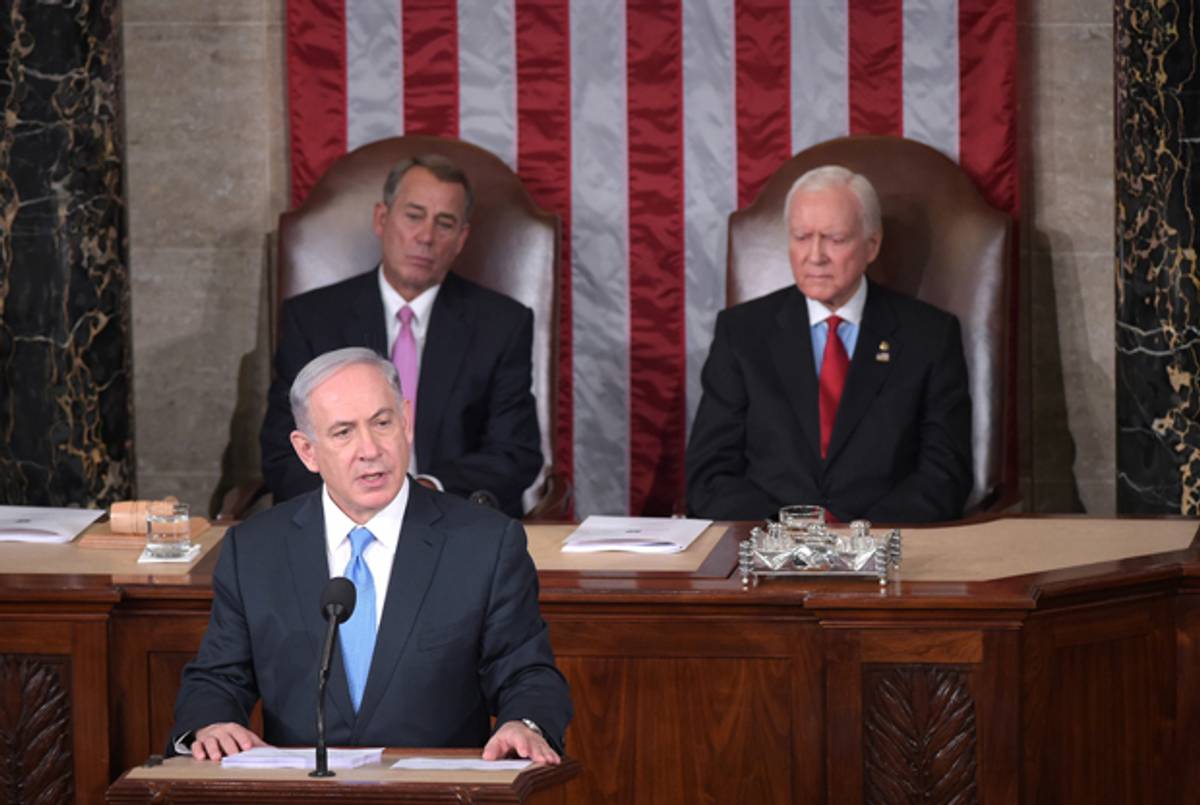
Today, Benjamin Netanyahu addressed a joint meeting of Congress on the dangers presented by a nuclear Iran, in a much-awaited event that had been the source of great controversy. Nearly 60 Democratic lawmakers boycotted the speech, in protest of what they characterized as a politicized attempt by Republican Speaker John Boehner to undermine President Obama’s foreign policy with Netanyahu’s assistance.
The speech was pointed, passionate and effective–as even critics agreed—the hallmarks of a Netanyahu address. It checked all the requisite boxes, laying out the various geopolitical threats posed by Iran, outlining concerns with currently considered proposals for a nuclear deal, and even offering the obligatory reference to the Purim story. “This deal won’t be a farewell to arms,” Netanyahu warned, “it would be a farewell to arms control.” What will prove less predictable than the speech’s content, however, is the impact it will have–if any.
Thus far, reactions among Democrats–the constituency Netanyahu must reach if he is to sway Congressional opinion–have been unsurprisingly mixed. On the one hand, House Minority Leader Nancy Pelosi—who was visibly agitated during the address—issued a sharp condemnation of Netanyahu’s words. “As one who values the U.S. – Israel relationship, and loves Israel, I was near tears throughout the Prime Minister’s speech,” she said in a written statement, “saddened by the insult to the intelligence of the United States as part of the P5 +1 nations, and saddened by the condescension toward our knowledge of the threat posed by Iran and our broader commitment to preventing nuclear proliferation.”
On the other hand, Senator Dianne Feinstein, the chairwoman of the Senate Intelligence Committee who had been scathingly critical of Netanyahu’s move to address Congress, told CNN afterwards that she agreed with the Israeli leader that a 10-year nuclear deal would be too short, and that she preferred 15-20. This was a significant statement from a powerful lawmaker, made all the more so by her strident opposition to Netanyahu’s appearance.
In the days ahead, then, the question will be which of these reactions carries the day. Will the anger felt by many Democrats at Netanyahu’s open opposition to their president’s policies lead them to reject any of his concerns out of hand? Or will they separate their upset from the proposed nuclear deal, and give Netanyahu’s points–when perceived as valid–their due consideration? If Netanyahu managed to shift the conversation in Washington to one about the merits of a prospective Iran deal, he will have succeeded to some extent. But if he simply damaged the fabric of the US-Israel relationship, while leaving the discourse largely unchanged, he will have failed.
In the long-term, however, there is another impact to consider: the broader toll on US-Israel ties, both when it comes to Democrats and the current administration. Will the Obama team still move to defend Israel as vigorously in international forums like the United Nations? Will a bipartisan Congress pass newly proposed legislation hamstringing the Boycott, Divestment and Sanctions movement by requiring overseas trade deals be conditioned on the boycott’s rejection? Or will support for these and other initiatives flag in the face of Netanyahu’s address?
None of these questions have clear answers, but what is clear is that the reverberations from this speech–for good and ill–will be felt for many months to come.
Previous: Bibi’s Day in Congress
Related: The Obama-Bibi Split Is About Policy, Not Protocol—And It May Be Permanent
Yair Rosenberg is a senior writer at Tablet. Subscribe to his newsletter, listen to his music, and follow him on Twitter and Facebook.